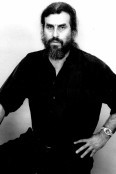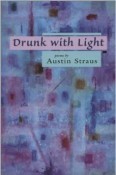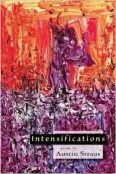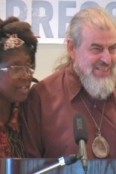“Since she died, I’ve written over two hundred poems to her.”
AUSTIN STRAUS
Interviewed By: Kaveh Akbar
Can you talk about The Love Project, the new collection co-authored with your late wife, Wanda Coleman -- how did you two decide to embark on the project? How did you decide which poems to include, and in what order? Was Wanda able to see the final product?
Wanda and I discussed the idea for The Love Project many years ago. We put it off to do other projects. I believe Wanda finally decided to do the book for at least three reasons: 1) she felt it would be a terrific book, 2) she wanted to make a statement, after more than 30 years, that, yes, she really did love me intensely, and 3) feeling that she might be dying, she wanted to finish the book and leave it as a gift to me, possibly to sell well so I’d have some money in my old age. The publisher, Red Hen, rushed it into print after Wanda died. It was originally planned to come out in April, 2014, but they got it out in January.
We knew an honest book of love poems would be risky, but we’d both written about our relationship extensively in previous books, though the “love” and sometimes the anger and pain, are buried among other poems. I had many love poems I’d held back from previous books as well as some new ones for this one. Wanda reprinted poems from her other books and added some new ones. The order of poems depended on a deep rhythm involving humor, seriousness, positives and negatives, and a large dollop of intuition, the ‘feel’ of each poem as a member of a larger whole. This is hard to describe and comes with lots of practice.
Wanda saw the final product just before her last, fatal illness. She worked on the manuscript very diligently and we both caught errors or changed words up until the last minute.
You’ve made one-of-a-kind poetry books for years, combining visual work with original verse. Can you talk about the benefits and difficulties with working in this mode?
My one-of-a-kind books are not poetry books per se. They may be visual poems, especially if there are words and word bits, letters, sentences, but they are not “poetry.” They are rather artworks, sometimes sculptures, in book form. Some are merely albums of paintings, collages, figures, landscapes, constructions. Others are, as a whole, a work of art.
I have a split artistic personality so that poems come from one aspect of my mind and visual work from somewhere else, though they do, at times, overlap especially when a poem evokes scenes and places or is very descriptive. I love improvisation, as I write, as I paint or burn (I use fire in my work, usually with a magnifying glass in the sun), and when I perform. I like not knowing exactly what’s coming next—the thrill of the process, trusting myself to produce something exciting and beautiful, becoming a master. I’ve been writing poetry seriously for about 40 years and making art right out of the womb 75 years ago. I’ve become quite confident doing either.
In your poem from the new collection, “Why Wanda Loves Austin,” you paint a charming but goofy portrait of yourself stuffing napkins in your ears at a club, demonstrating your “balletic chopstickery” at a Thai restaurant, and “slurping up baseball on color TV” in the home you shared. A few poems later, you write, “We bite big chunks out of each other’s hides. / Teeth marks. Blood. Blood spurts / all over our lives.” The impulse in writing a book like this would be idealize the marriage – how consciously did you have to work to avoid mythologizing the relationship?
Neither of us wanted to “idealize” or “mythologize” our marriage. In fact, we tried hard for a balance. I think there are more indications, in these love poems, of the difficulties of a marriage between two smart, stubborn, opinionated poets, or any two creative entities, than in any book of love poems, with a few exceptions . . . Sylvia Plath and Ted Hughes? I haven’t read everything, so maybe I’ve missed something. I believe my section of The Love Project suggests more of the negatives in the marriage than Wanda’s, though she had some pretty rough poems in previous books.
Do you have a favorite poem from her section of the collection?
I have so many favorites, it’s like picking out your favorite child or cat or friend. I love “what it is about us,” “Romantics,” “Scylla and Charybis,” “AFTERWARDS WE MAKE UP,” “Lay,” “what I know of my man,” (especially), “Give Me Time,” and “Sonnet for Austin,” as well as all the others.
In The Love Project, you include two lists, one called “Our Movies” (including "A Streetcar Named Desire," "La Strada," "The Triplets of Belleville") and one called “Our Songs” (including “Black Coffee” – Peggy Lee, “Daydream,” – Duke Ellington, “Take Five,” – Dave Brubek). She ends her “Sonnet for Austin,” with the line, “I love you as today loves yesterday – the way Billie loved Prez”. The connection you two shared through the art you loved is tangible throughout the book. Can you talk about how that connection has transformed today, listening to a Lester Young record or watching "La Strada"?
This is a painful question because I still find it hard to watch our favorite movies (there are actually hundreds), listen to Otis Redding, Patsy Cline, Kurt Elling or her favorite classical and jazz works, or even watch TV shows she enjoyed. I am deeply moved by all sorts of music, especially Oum Kalsoum’s singing (Arabic), klezmer, fado, and anything with duende or soul. Since she died so recently, I’m extremely vulnerable to intense feelings expressed in song, music, film, art or any other form. There are poems by Neruda, Hikmet, and others that destroy me.
Lorca ended his famous essay on duende with a “wind of the spirit” that came “announcing the endless baptism of freshly created things.” This book does kind of feel like that, capturing the spirit of the life you and Wanda shared and anointing it in verse.
I believe the love poems and others address this better than any brief prose might. I will say that being with Wanda was never boring. I never knew which Wanda was present; she was so many different but simultaneously present personalities, most loving and caring, some uptight, and a few ready to explode at the slightest (sometimes mistaken) perception of an insult or insensitivity.
There is no way, except perhaps in poetry, music or dance, to convey the complexity and depth of a long marriage between two artists -- complicated by the fact that of our very different contrasting backgrounds: a black girl growing up in the Watts/Florence area of South Central Los Angeles, one parent from Arkansas – a retired boxer who was Archie Moore's sparring partner and friend, the other parent from an Oklahoma farming family that did well even during the Depression. My father was a postal worker and frustrated artist/poet, born in Brooklyn. My mother came to the U.S. from Russia, spoke Yiddish. I grew up in a largely Jewish section of Brownsville. A Brooklyn Jew, age about 42, fell in love with a Black woman from L.A., age about 34. Each married and divorced twice. We somehow knew that we were "fated" ("beshert" in Yiddish), loving so many of the same things (apart from great sex): jazz and classical music, great films, good eating, dancing, shooting pool, going for long walks, heavy philosophical conversations, good old TV (The Twilight Zone, Hitchcock Presents, Perry Mason), and great literature, especially poetry of Neruda, Lorca, Vallejo, and many others. We had fun doing a radio interview show for 14 years. We sometimes performed together. (See YouTube version of me and Wanda performing my poem 'Red'.) We loved to travel together -- often to San Francisco, once across country to North Carolina, occasionally elsewhere (Washington State, Arizona, New Mexico, Oklahoma, Kansas -- sometimes to visit Wanda's relatives), often to San Diego when my parents were alive, and all over California.
Once a relationship becomes established and deepens over time into something permanent and unbreakable, the subtle, nuanced unsayables between the couple can become the stuff of poetry, as shown in The Love Project, but also remain the private, deep nonverbal music of a solid marriage. That, luckily for me, is what I had with Wanda.
Is there anything you’d like to say about how Wanda imagined or planned for her legacy during her illness?
I’ve answered this, sort of. Wanda wanted her relatives to share in the profits from the sale of her archives.
Her other more important, legacy is her work. I not only plan to publish anything of hers that is worth publishing, but I’m in the process of creating at least one poetry prize in her name as well as other possible ways of memorializing and perpetuating her amazing career and high-quality work.
You’ve recently been absorbed in managing Wanda’s archives, which I understand represent decades of writing. What’s that process been like? What sort of new discoveries have you made? What are your plans for that which you’re uncovering?
Dealing with about fifty-plus years of Wanda’s archives has been an intense, sometimes disturbing, always overwhelming chore. There are hundreds of cartons which are being converted into labeled banker’s boxes filled with manuscripts, published and unpublished. There are about four to five dozen notebooks of correspondence, and lots of loose letters, uncatalogued. There are thousands of books, magazines, anthologies, many of which contain her published poems. There are tapes, films, CDs, photographs, and lots of other stuff. The manuscripts, which include, in some cases, up to eight drafts and revisions of her many books, and the correspondence, are the most valuable items from the point-of-view of institutional collections.
Not all my discoveries have been pleasant. In letters to a certain close friend, Wanda often discussed our relationship, and she is sometimes very rough on me. That was painful to read. At other times, when she is not venting or treating her correspondent as her therapist, she is most loving and complimentary. There is no doubt in my mind, after reading most of her letters, that Wanda loved me deeply (it’s in the poems!), but even the occasional negative is like a spear to the gut.
The most important “discovery,” which
Wanda meant for me to find, is a letter, hand-written twice in a little notebook she had with her in the hospital, and which she left in her purse. This letter is her will, and apart from asking to be cremated (which I knew and did),
and that I get along with her relatives (very difficult), and share the proceeds of the archives sale fairly with them (which I intend to do), she says, after hoping The Love Project will earn some money and that I become a more famous artist, she closes with “take care of your feet” (I have diabetic neuropathy) and “Remember that I loved you.” That last line means everything to me.
That's beautiful. She wanted you to “stay calmly alive / with all parts working,” to borrow language from one of your poems. Surely creating new work factors into that – what're your plans for your own writing and art, moving forward?
I am busily working on my unique artists books. I just returned from a month-long sales trip to the East Coast where I sold my books to the Library of Congress, Johns Hopkins, the NY Public Library, the Rhode Island School of Design (RISD), Harvard, Boston Public Library, Dartmouth, Bowdoin, and the Schomburg Collection in Harlem. I stayed with many friends including NY activist Bob Holman and poet/biographer Quincy Troupe and his wife Margaret who also purchased my books. An amazing trip!
Not only am I making books, but I'm planning more paintings and collages. I am looking for a loft so that I can work larger than I've been.
I am always writing poetry. I wrote seventy-nine poems to Wanda in the first two weeks after we hooked up in May, 1981. Some of these are pretty good. Since she died, I’ve written over two hundred poems to her, more than one a day. A major publisher has expressed interest. That will be yet another way to honor her memory. I am planning to put the best of my first love poems to Wanda together with the best of my recent ones, all unpublished. She will always live vividly in my heart. I also have a large book of poems in the works called Drawing in the Dark.
Can you leave us with one special anecdote from the life you and Wanda shared?
My favorite "anecdote” happened when Wanda was invited to do a reading at the retirement party of a well-known black professor who admired Wanda. In a large room filled with students, Wanda was doing her usual mesmerizing performance. I sat at a table with the retiring professor’s son and his white wife who, it turned out, had gone to the same high school I attended, the famous old Erasmus Hall in Brooklyn. Wanda then got to a recent poem she'd written for Bob Holman whose wife, the artist Elizabeth Murray, had recently died. The poem, called “The Kiss,” is in one of Wanda's last books. Suddenly, here comes Wanda down off the podium and heading towards me. She stopped and gave me a long, deep French, a kiss that made my head spin. I turned purple as the students all oohed and ahhed. Everyone thought this was part of our 'act', but it wasn't -- just a sudden lovely surprising impulse on Wanda's part. She went back and finished her reading as I sat there, glowing, smiling, my face turned a deep red.
Then the retiree took the stand and said (I'm paraphrasing from memory), "Wanda just taught me a lesson. I confess I have always been uncomfortable with my son's interracial marriage but now I realize that I have been a fool. Thank you, Wanda."
That was a gutsy thing for her to admit in public and everyone was deeply moved. I then, and later, understood why Wanda had kissed me in public. She knew that her friend had a problem, and that's how my brilliant wife solved the problem.
Interview Posted: September 1, 2014
MORE FROM DIVEDAPPER. (Drag left)





















































































